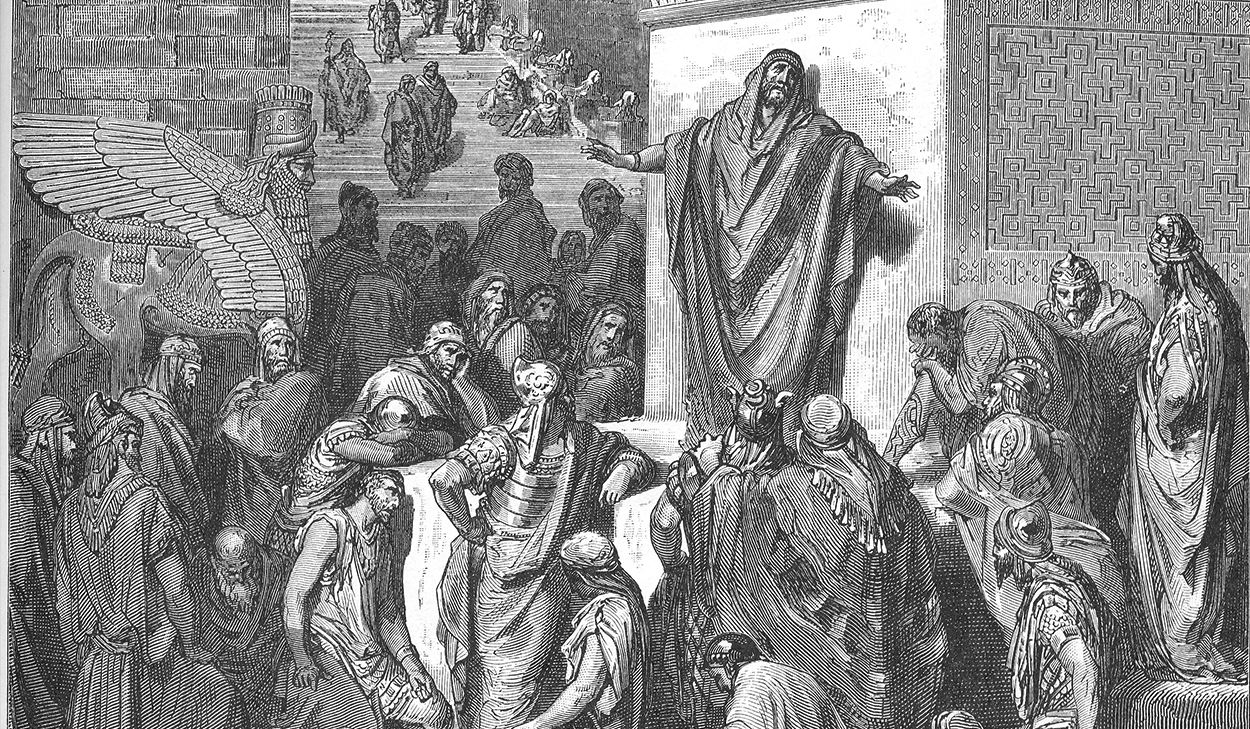
The Book of Jonah is one of the most recognizable and unbelievable stories in Scripture. Believers of all ages have heard this fantastical story of a prophet running from God, being swallowed by a fish, ejected from the fish three days later, and then finally following through with his mission.
It can be easy to brush past this stranger-than-fiction tale as just another wild Bible story to turn into a Sunday school song. But beyond the science-defying wonder of this book, Jonah reveals deep, theological truths about the nature of God and man.
Though the book is named for the prophet, it’s important first to know what this Scripture says about God.
A Merciful God
“The word of the Lord came to Jonah son of Amittai: ‘Go to the great city of Nineveh and preach against it, because its wickedness has come up before me.’” -Jonah 1:1-2
The book opens with God calling Jonah the prophet to go to Nineveh. This command stands out because of the people who lived in this great city.
Nineveh was the capital of Assyria, one of the most powerful empires of ancient history. A brief look through 2 Kings shows what kind of people the Assyrians were.
“In the time of Pekah king of Israel, Tiglath-Pileser king of Assyria came and took Ijon, Abel Beth Maakah, Janoah, Kedesh and Hazor. He took Gilead and Galilee, including all the land of Naphtali, and deported the people to Assyria.” -2 Kings 15:29
“In the ninth year of Hoshea, the king of Assyria captured Samaria and deported the Israelites to Assyria.” -2 Kings 17:6a
“In the fourteenth year of King Hezekiah’s reign, Sennacherib king of Assyria attacked all the fortified cities of Judah and captured them.” -2 Kings 18:13
This is only a sampling of the brutality of Assyria. The nation had a pattern of attacking the Israelites—God’s chosen people—and exiling them.
The Assyrian city of Nineveh was the capital of God’s greatest earthly enemy at the time.
So why did the Lord want Jonah to go behind enemy lines and preach against the Ninevites? Why not just destroy the city or thwart the Assyrian’s plans as He had done before?
The answer lies in God’s desire for people from all nations to come to know and worship Him.
“I urge, then, first of all, that petitions, prayers, intercession and thanksgiving be made for all people—for kings and all those in authority, that we may live peaceful and quiet lives in all godliness and holiness. This is good, and pleases God our Savior, who wants all people to be saved and to come to a knowledge of the truth.” -1 Timothy 2:1-4, emphasis added
Jesus told His followers to make disciples of all nations (Matthew 28:19) and to be witnesses to the ends of the Earth (Acts 1:8) so that people from every tribe and language will worship Him (Revelation 7:9). God’s desire has always been for every distinct people group—including His enemies—to know and love Him.
For the Ninevites, that wasn’t going to happen without some assistance.
God calls the people of Nineveh those “‘who cannot tell their right hand from their left … (Jonah 4:11).’” This phrase is an idiom that most likely means that they didn’t morally and spiritually know right from wrong. Yes, even those who sin apart from the law will be judged and perish apart from the law (Romans 2:12). And, yes, the Ninevites were evil and recognized their sin as evidenced by their response in Jonah 3. But they did not know and trust God personally and would suffer His wrath if they did not turn to Him. The Ninevites, in essence, were an unreached people group.
The people of Nineveh were the Lord’s enemies, spiritually blind to their wrongs. And God in His mercy sent a prophet to open their eyes. Even though God knew that the Ninevites would one day turn against Him again (Nahum 1-3), He still gave them a chance to repent.
Salvation comes from the Lord (Jonah 2:9), who is gracious to those who don’t deserve His grace. He cares for all nations and is revealing Himself to them—from a small group of pagan sailors in a boat (Jonah 1) to a city of more than 120,000 people.
If God is merciful to all peoples, shouldn’t all believers be burdened for the nations to know Him?
Next week, we’ll see that isn’t always the case.